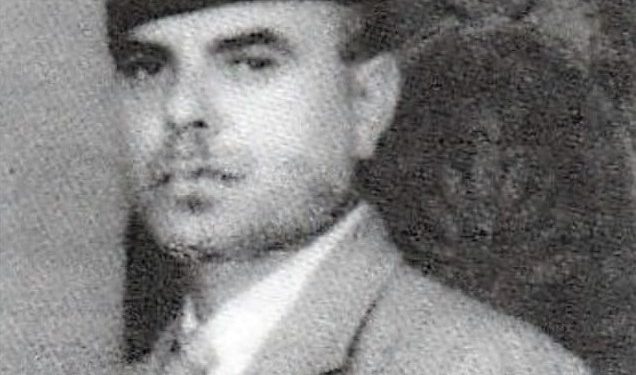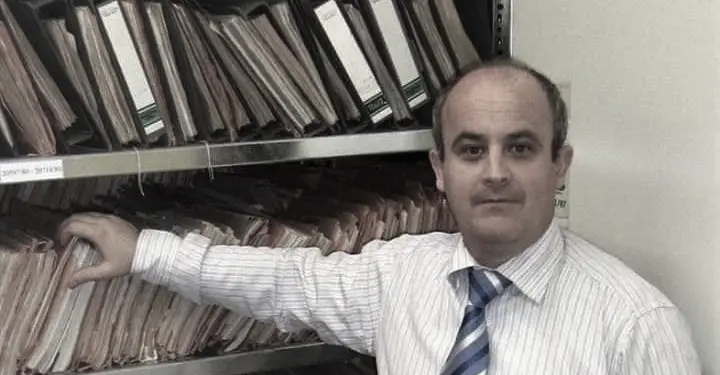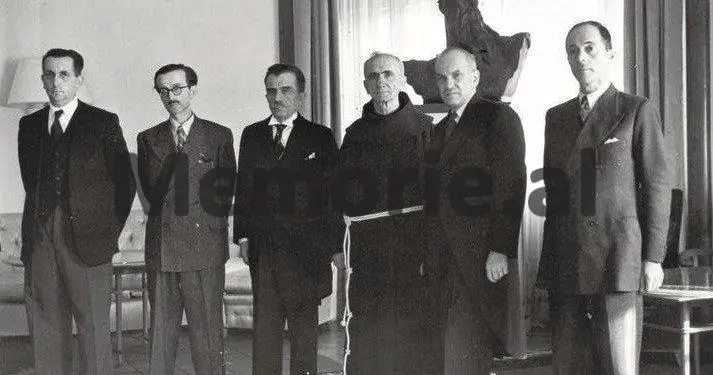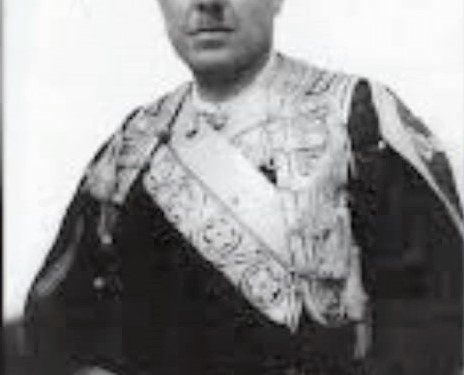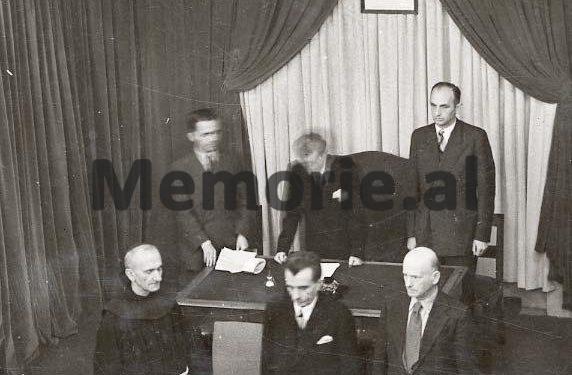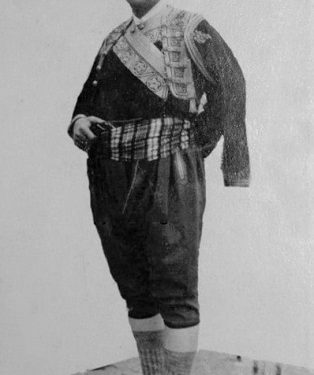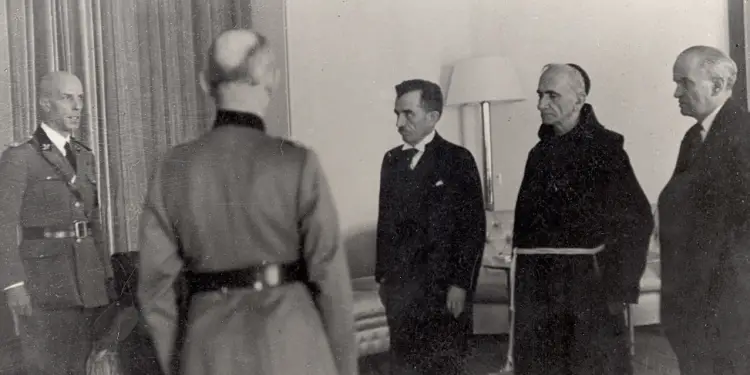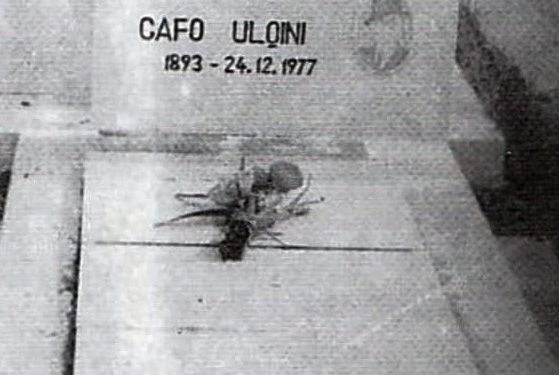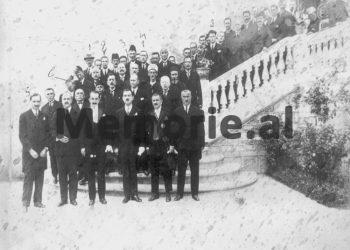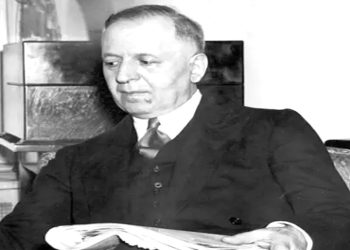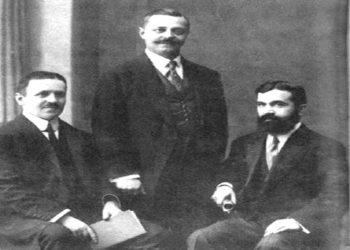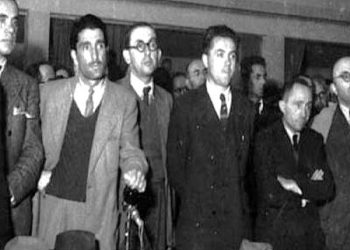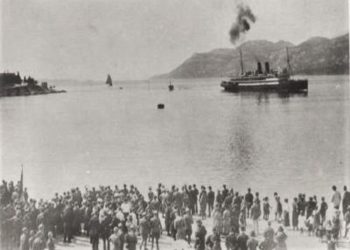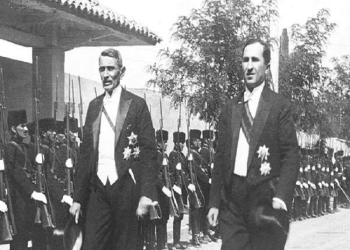By Kastriot Dervishi
Memorie.al / In the history of Albania, there are two periods that recognize as the head of state, the collegial body, called the Council of Nalte. The first period is that of January 31, 1920 – January 21, 1925, when Albania was the Kingdom and King Wilhelm von Wied was not in the country, and the second period was that of October 25, 1943 – October 25, 1944, when after the capitulation of Italy fascist, independence was re-proclaimed in Albania and the Constitution of 1928 was renewed and until the arrival of King Zog, the duties of the head of state were exercised by the body called the Supreme Council of the Regency.
Albania of the years 1943-1944, a not very well-known time
The elections to the legislative body of the state, called this Constitutional Assembly, ended on October 1, 1943. Due to the circumstances of the war, the deputies were elected by the respective municipal councils. On October 22, 1943, the National Assembly approved and decreed its 5 decisions that made possible:
- The annulment of the decisions of the Assembly of April 12, 1939, which had “voted” for: “personal union” between Albania and Italy.
- The abrogation of all laws that contradicted the decision of October 22, 1943.
- The appointment of the institution of the High Council of the Regency for as long as the war would last, as well as its exercise of executive power. Likewise, the High Council of the Regency jointly exercised legislative power with the Parliament.
- Re-enforcement of the Fundamental Statute of the Kingdom of Albania of 1928. In point 5, it was textually stated:
“The decree-law dated June 9, 1940, published in the Official Gazette no. 93, dated June 10, 1940, converted into law no. 128, dated August 19, 1940, by which Albania was known, is considered to have been and remains without force for any effect we enter into war with those countries with which the Kingdom of Italy has been at war” (see Official Journal”, no. 106, November 23, 1943, Tirana 1943).
Exactly the last point defined Albania as a country not only sovereign but also outside the military alliances of the time.
This fact is very important since the Slavic-Communist propaganda has constantly wanted to give the power established in Albania in the years 1943-1944, the colors of collaborationism. The professor of the University of Paris, Charles Rousseau, who is one of the most famous jurists in public international law, has considered that Albania’s independence was restored on September 14, 1943, and that the so-called “personal union” between Albania and Italy took end 22 October 1943 (see “Revue da Droit International Public”, Janvier 1973).
Who were the regents?
After the declaration of independence on September 14, 1943, by the Provisional Executive Committee, the leadership of this committee organized the elections of October 1, 1943, for the National Assembly, which convened on October 16, 1943. The Supreme Council was formed as a body the temporary one that replaced the King, as long as he was not in Albania.
The Law on the Supreme Council was approved by the Constitutional Assembly on October 21, 1943 (see “Official Gazette” December 13, 1943). It had 15 articles and gave this body the powers of the head of state, such as the direction of the General Command of the Armed Forces, the appointment of senior state officials, the decreeing of laws, treaties, etc.
The Supreme Council had no right to declare war without the approval of the Parliament, except in the case when we were dealing with the self-defense of the homeland. The Chairman of the Nalte Council worked in rotation for a period of 3 months. Other attributes were exercised according to the constitution approved on December 1, 1928.
On October 25, 1943, the National Assembly elected Mehdi Frashëri, Lef Nosi, Fuat Dibra and Father Anton Harapi as members of the Supreme Council. The latter assisted in all the meetings held with the presence of the Supreme Council, but he was sworn in on January 13, 1944, after having received the permission of the Pope of Rome.
The first rift in the heart of the Nalte Council begins with the government crisis. The Chairman of the Supreme Council, Mehdi Frashëri, on behalf of the highest institution of the state, accepted the resignation of Prime Minister Rexhep Mitrovica on June 16, 1944 (see “Union of the Nation” June 17, 1944). A few days later, the Prime Minister, Rexhep Mitrovica, participated in the congress of the “Albanian Red Cross”, where Koço Tasi was re-elected as chairman. (“Union of the Nation” June 20, 1944).
The government crisis continued for many days and involved the Supreme Council, adding to the disagreements within it, where Father Anton Harapi resigned and Lef Nosi asked for a letter-delegation of powers, until his resignation was accepted (“Union of the Nation” June 27 1944). The first regent refused to return to office, while Lef Nosi continued in office after the letter of delegation was deemed illegal. However, Parliament continued to unsuccessfully ask Father Anton Harap for his reinstatement (see Mihal Zallari’s letter in “Bashkimi i Kombit” June 28, 1944) and his seat remained empty and was never replaced.
Cafo Beg Ulqinaku, in Albanian politics
In the years 1941-1944, when Albania was united with other Albanian territories across the border, many well-known people were integrated into the politics of the time to realize their national goals. Thus, Cafo Beg Ulqinaku, who was the mayor of his hometown and since April 18, 1942, he was also a deputy in the state legislative body, called KEFK.
After the capitulation of Italy and as a result of the collapse of the “Personal Union”, the actions described above follow. At that time, the city of Ulcinj was part of the Prefecture of Shkodra, which elected the following persons as deputies in the state legislative body: Filip Llupi, Mark Gjonmarkaj, Gjon Zef Kastrati, Cafo Alibegaj (Ulcinac). The latter was the deputy of Ulcinj. On October 23, 1943, the National Assembly made a decision according to which “due to the extraordinary circumstances and the shortness of time, the National Assembly, by common consent, decided, from its gender, to issue a representation consisting of two misa (deputy) for each prefecture, to which the representative delegates all the attributes of the Assembly for an indefinite period”.
This agency was not paid but only received a daily allowance. On the other hand, the Provisional Executive Committee remained in force until the formation of the new government (on November 5, 1943), and during this time, participated in the meetings of the Parliament. The Prefecture of Shkodra was represented by Cafo Beg Ulqinaku (for Ulqin) and Filip Llupi (“Conversations of the National Assembly 16 October 1943-13 January 1944, Tirana 1944). Just a few days before he was elected a member of the Supreme Council, on 2 June 1944, Cafo Begu organizes the defense of Ulcinj and its surroundings.
In the village of Katërkolë, he organized the “General Congress” with the participation of representatives of all the districts as well as with the participation of the local civil and military authorities. Cafo Begu, in the capacity of deputy of Ulcinj in the Albanian Parliament, gave an enthusiastic speech at this congress, where he addressed the situation and the urgent needs of the country, to face the attacks of the Slavs militarily. Among other things, in this meeting he said:
“I know that most of the villager are united with each other, but in order to realize this true union, we must give each other the Albanian pledge, to protect until the last drop of blood, the land of This is the main reason that forces us today to become steel, united in a union, without differences of religion and region, because the enemy does not know where and when he will attack us.
Today more than ever, we must be united, we must swear before the altar of heroes and the homeland that we will defend our integrity and our brotherhood! Do you present swear that: you will give each other the Albanian oath? Do you swear that: you will not betray the motherland? Long live Albania! Long live the Albanians! Albania of Albanians!”
This meeting elected a general committee based in Ulcinj, which had two members, as well as all municipal committees with three members each. In this meeting, about 100 thousand gold francs were given by the people, for the needs of the country’s defense.
How did Cafo Ulqinaku come to the High Council of the Regency?
The death of Regent Fuat Dibra, on February 22, 1944, left an unfilled place in this collegial body, which performed the duties of the head of state. After Ibrahim Biçakçiu had refused to occupy the vacant seat, the Upper Council of the Regency appointed on June 25, 1944, without the consent of the Parliament, the former Prime Minister Rexhep Mitrovica, who continued to remain in office until the election of the new Prime Minister.
The situation in question created an institutional irritation between the Regency and the Parliament, so much so that it forced Rexhep Mitrovica to resign on July 10, 1944, in order to serve in this way the quick resolution of the crisis. In these circumstances, Cafo Beg Ulqinaku was elected by the Parliament on July 10, 1944, as a member of the High Council of the Regency, instead of Fuat Dibra, actually succeeding Rexhep Mitrovica (see “Union of the Nation”, July 11, 1944 as well as Central State Archive of the Republic of Slovenia, Fund 246, Year 1944, File 35). Two days later, on July 13, 1944, diplomatic representation between Albania and Germany increased as Martin Schlipp was appointed German ambassador in Tirana and Rrok Gera, Albanian ambassador in Berlin (“Bashkimi i Kombit” July 14, 1944).
The rise of the diplomatic level once again shows the international status of Albania in those years. As a member of the High Council of the Regency, Cafo Beg Ulqinaku participated in the swearing-in ceremonies of the governments of Fiqri Dines (July 18 – August 28, 1944) together with the other two regents, Mehdi Frashëri and Lef Nosi (since the other regent Father Anton Harapi, had resigned), and in the government of Ibrahim Biçakçi (September 7 – October 25, 1944)
‑The Dine Government was voted into Parliament on 24 July 1944 (“Union of the Nation” 25 July 1944). The Prime Minister emphasized that “the presence of German troops in Albania is temporary, determined by the conditions of the war”. He also said that his government would pay attention to the national ideal, saving as much as possible from the disaster.
– The Biçakçiu government was voted in on September 14, 1944. The Prime Minister said in his speech that his government would not ask the people for any sacrifice that the first one would not make. “Our best weapon – said the prime minister – will be love for the country” (see “Bashkimi i Kombit” September 14, 1944).
The last activity of Cafo Beg Ulqinak
The approach and then the arrival of the communist troops in Tirana and the massive outbreak of civil war by them, forced the High Council of the Regency and the government to stop their actions and, together with other patriots, to settle in Shkodër, where on October 18, 1944, held a meeting in the city hall, for a possible reaction against the communist uprising, which was also supported and encouraged by the Yugoslav Communist Party. At the meeting in Shkodra, there were two groups: one was for leaving the country and the other for staying in Albania. Cafo Beg Ulqinaku together with Lef Nosi, Anton Harapi, Ibrahim Biçakçi, etc., liked not to leave the homeland.
This action, although idealistic, had tragic consequences for many of the well-known figures of Albania at that time. Cafo Beg Ulqinaku was also arrested by the communist forces at the age of 62. Not much is known about the end of his life. In the few data we have, we learn that he was politically sentenced to 8 years in prison, and that he lived in Shkodër after his release from prison. Cafo Beg Ulqinaku died in Shkodër, in 1977, at the age of 85. Some details about his life are given by an interview of his daughter, Lumnie Murteza (Alibegu), who lives in Bosnia and Herzegovina and whom the Albanian community there, on the occasion of the celebration of November 28, 2001, has declared her an honorary member.
The interview that the daughter of Cafo Beg Ulqinak, Lumnie Murteza (Alibegu) gave to the newspaper “Kronika” of Ulqin on May 14, 2003.
This text was sent to me on November 19, 2003, after my request, by e-mail from the publisher of the “Kronika” newspaper of Ulcinj, Mr. Ilir Çapuni. The interview was conducted in Sarajevo by Suada Milla and is being published in the “55” newspaper, complete with some literary editing. In this interview, the daughter of Cafo Alibegu, Mrs. Lumnie Murteza, talks about the only 13 days of her life that she was able to stay with her father.
Was it easy to be the daughter of Cafo Beg Ulqin?
At that time it was very difficult. We have lived with a fear on one side, while on the other side we have been proud of his name. Mother has always glorified and praised her in front of us, that we were so small when we were separated from our father and we didn’t know whose daughters we were. Mother was the one who taught us to love and respect our father.
You are talking in the plural!
Yes, even in the name of the sister and the mother. We lived in Shkodër. In 1945, I was four years old, my sister was one and a half years old, and my mother was young, when we were arrested and taken to the camp. That I will never forget that day, which is embedded in my memory. The father was illegal, but at home, when he saw some people in uniforms approaching the house, he started to surrender, because he knew that they would arrest his family if he did not surrender. He did not want to let us suffer because of him.
The mother, a courageous and manly woman, who loved and respected her father very much, begged and insisted that he not give up. At one point, she pushed my father into the room, closed the door behind her, took me by the hand, grabbed my little sister by the cradle, and went in front of the soldiers. The soldiers put us in a car, (while we had the right to take some things basic) and sent us to Shkodra prison. They kept us there for four months. From there they took us to Kuçovo, a place near Durrës. We stayed there for several months. I remember that the water we drank there smelled of oil. From there they took us to Berat, there for a year. Then to Valias, a small village from which I remember some cattle stables where we used to stay. Even there they kept us for a year. I remember very well an incident from that time.
One day, in a large room, we were sitting all the women and children of the trench, when a group of soldiers came. They called the women one by one. When it was my mother’s turn, she grabbed me and my sister by the hand, not knowing what was going on. One of the soldiers with several high ranks turned to the mother and said: “If you give up and deny your husband, today you and your children will be free.” I was amazed at the courage of my mother, a small woman of stature but with a big heart, when she proudly answered the high-ranking soldier: “At this moment you can shoot me with both girls, and I will not give up from my husband’s name and remain his wife as long as I live.”
The soldiers looked at each other and left. After the father found out about this case, he sent his sister, our aunt, to convince the mother to give him up, which the mother never accepted. During the entire time of exile, the mother worked hard in the fields, cleaning up the ruins left after the war. Since there were many other families like ours, while the women worked, one of them looked after the children? Valias was our last place of internment, from where we were released. We came to Shkodër, to my aunt, while on April 1, 1948, we returned to Tivar, to the property inherited by our mother from her mother, and we continued to live with the hope that we will meet and join our father and become a united family. . In 1952, we received a letter from my father, where he informed us that he was in prison in Albania, sentenced to eight years in prison, as a political opponent…! During that time, since he was not in strict prison, he was engaged in writing and, when he was released, he came to Shkodra to his sister, where he lived until his death.
How do you remember your father and the first meeting with him?
My great desire was to see my father. I remembered very little from my childhood. Many times we asked for a visa as a family, to visit my father in Shkodër. After many attempts, only I had that luck. It was September of 1974, when I, together with my two young sons, obtained a visa for Albania. The first meeting with the father… (Tears run down his cheeks), hard to describe. He waited for us on that side of the border and looked at his mother and sister, waving to them from afar. What can I say, we broke up when I was only four years old, and I met him when I was a 33-year-old woman, with two children at rest, while he was 82 years old. I’ll never forget… (Eyes fill with tears again)…a detail, when I said to my little son, Arben, “Call grandpa”, while the father turned to me and said: “Is it is it possible for someone to call me, grandma!? I didn’t have the chance to hear my children call me – dad, I’m thankful that I managed to get my grandchildren to call me grandma”!
I stayed in Shkodër for only 13 days. The father, although he was quite old, was physically and mentally healthy, and at that time he was writing memoirs. I can say that I spent only 13 days of my life with my father, alive forever, but in my thoughts we were always with him. For this I want to thank my mother, who has always spoken to me about her with special love and respect. We read the letters we received from him several times. My mother told me and my sister to read my father’s letter.
I was very young, and I told her: “Yes, mother, we have read it”, “I know – she said – but read it again”! I have heard from others that he was a precious and honorable person, however, I was surprised by the fact that I proved in Shkodër. While walking with him through the streets of Shkodra, people got off their bicycles and greeted him with special respect.
He was the only person who, in that communist regime, was addressed with the title of bey. After 13 days we broke up forever. It was a very difficult parting, both he and I knowing that this was our first meeting and our last parting. After three years, he died in Shkodër, where he was buried in 1976.
After this sad and proud confession, let’s turn the conversation a little to your family life, marriage, children, studies at the Faculty of Dentistry, which, as far as I have heard, you are also a doctor. The first in dentistry, an Albanian woman from Ulcinj, maybe Tivari…?!
Ms. Liri: After we returned from Shkodra to Tivar in 1948, I enrolled in school. I spent primary and secondary school in Tivar. After graduating, I got married and came to Sarajevo. There I enrolled in the Faculty of Dentistry, where I also graduated. I work at the Tobacco Factory in Sarajevo, from graduation until now, from where I hope, in a short time, I will retire.
You were a wife and mother when you graduated. How did you succeed?
My married life is in real harmony. I wouldn’t have succeeded if I didn’t have the support of my husband, Osman. I had great support from him and my every success was our joint joy. You asked me about the children. Osmani and I have two sons and we are proud of them. Senadi, the eldest, works as a gynecologist at the Clinical Center in Sarajevo and, at the same time, is an assistant at the Faculty of Medicine at the University of Sarajevo. Arbeni, the younger son, studies at the Faculty of Law, while he is currently giving the exams for the third degree.
It was a pleasure to talk with a lady like you, in the full sense of the word.
Ulqini honors the regent Cafo Ulqinaku and sets an example for Albania
Not many days ago, the Municipal Council for Naming the Streets of Ulcinj headed by Mr. Mehmet Bardhi, named the streets of Ulqin, with the names of some of the Albanian personalities, one of them, Cafo Beg Ulqinaku.
Note the new street names of Ulcinj:
1‑Sailors of Ulcinj (Rana)
2‑Hafiz Ali Ulqinaku (From the top of the bazaar to Rana)
3‑Ymer Prizreni (Mahalla Re)
4‑Cafo Begu (From Rana to “Vracar”)
5‑Mujo Ulqinaku (From Kino to Galeb)
6‑Gjergj Kastrioti Skënderbeu Boulevard (From Maja da Pazar to the Municipality)
7‑Frashëri Brothers (From the Municipality to the highway at the entrance of Ulcinj)
8-Mehmet Gjyli (Totoshi)
9‑Kosovo (Pinjeshi)
10‑Mother Teresa (From the Municipality to the old pump)
11‑Teuta (From the old pump to Portamilene)
12-Mehmet Beci (Mali i Bardhë)
13-November 13-28 (From the Old Pump to the crossroads for Zogaj)
While other roads are:
14‑Appendices
15‑Dom Simon Filipaj
16-December 16-28
17‑Rudaj
18-Sheshi in Katerkolle
19‑Shkodre
20‑Kripore
21‑Kadi Hysen Mujali
22‑Dom John Buzuku
The case in fact aroused the jealousy of the Montenegrin central authorities, which passed the case to the Constitutional Court. On December 5, 2003, the chairman of the Municipal Council for Street Naming Mr. Mehmet Bardhi announced that on December 3, he received the letter of the decision of the Constitutional Court by which this body declared the decision of the Municipal Assembly of Ulcinj on the naming of the streets as unconstitutional, on the grounds that according to the Constitution, the signs had to be written first in the Serbian language and then in the Albanian language.
“This, said Mr. Bardhi, will give us a good reason for further political action to clarify the issue of language equality in Montenegro.”
However, Ulqin and its local rulers, with all the unfavorable conditions they are in, have given a national lesson to the rulers of Albania, who have not yet been cleansed of partisan and Bolshevik mentality.
Just a few days ago, an official of the municipality of Tirana who dealt with the names of the streets of the capital, announced to a private television that in Tirana 60% of the names of the streets were in commemoration of the “National Liberation War”. This means that a few insignificant and even more harmful months of this war (actually a civil war) are our entire history. Why is there no street name in Tirana such as Mehdi Frashëri, Padër Anton Harapi, Lef Nosi, Fuat Dibra, or even Cafo Beg Ulqinaku. Even a street name that was put in Elbasan to remember Lef Nos, went to some socialist disputes who, as always, have their mind on “war”. Memorie.al




